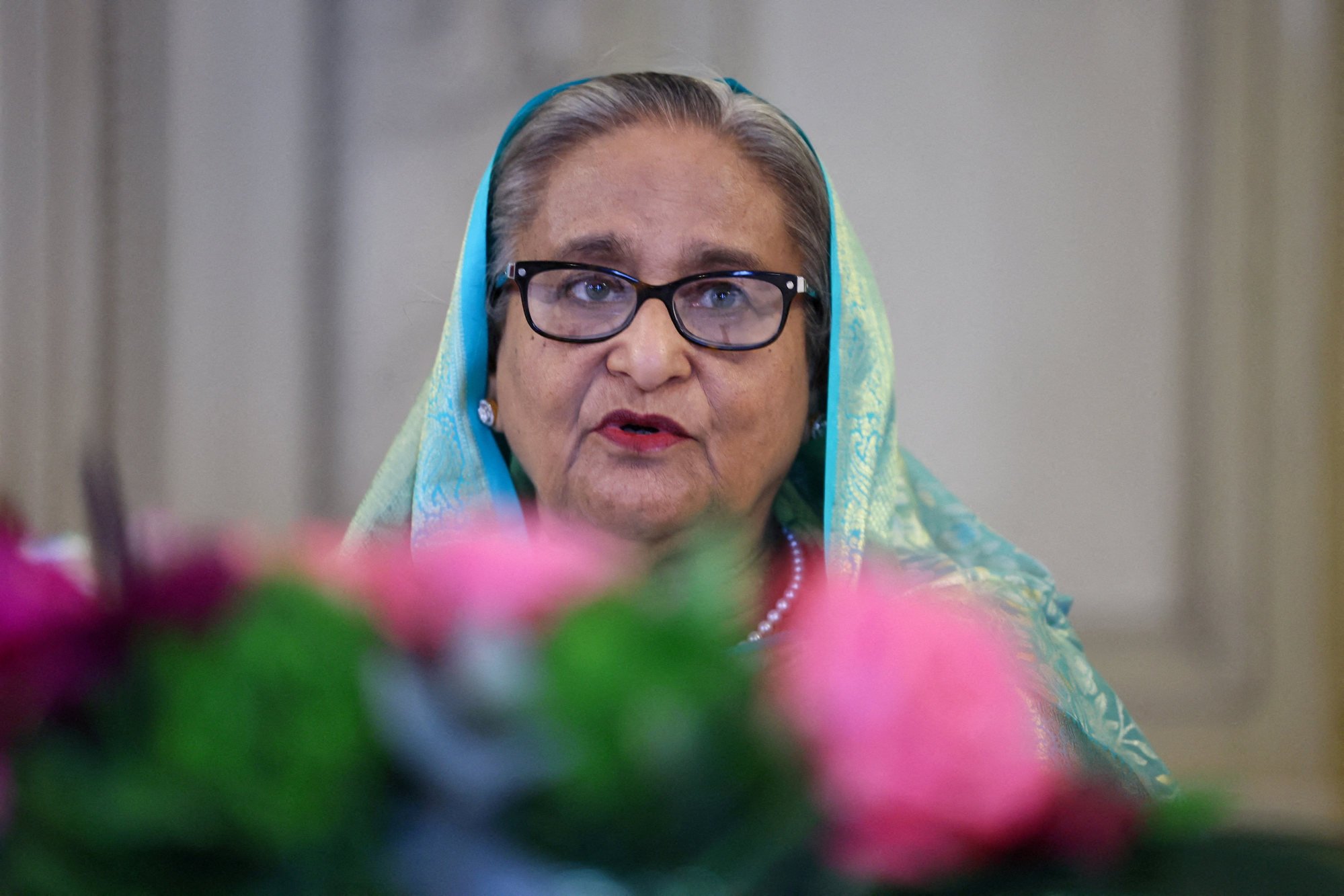The dramatic departure of Bangladesh Prime Minister Sheikh Hasina could heighten challenges for the US and India in curbing Beijing’s influence in the Indo-Pacific, US-based analysts said on Monday.
“The ouster of Hasina might pose new strategic challenges for both the US and India, because there’s a vacuum that could be filled by a more pro-China government,” said Michael Kugelman, director of the Wilson Centre’s South Asia Institute.
“That’s a problem for both the US and Indian strategic goals,” he added, noting that the exit of Hasina after 15 years in power would “provide an opportunity for the likes of more pro-China political factions to return to power”, particularly the opposition Bangladesh Nationalist Party.
Do you have questions about the biggest topics and trends from around the world? Get the answers with SCMP Knowledge, our new platform of curated content with explainers, FAQs, analyses and infographics brought to you by our award-winning team.
Hasina had led Bangladesh, a nation of 170 million, since 2009. Her flight followed protests stretching over weeks concerning the allocation of civil service jobs, which eventually resulted in a crackdown by government security forces, with nearly 300 people reported to have been killed.
On Monday, after being given an ultimatum by the military to leave the country, she resigned and fled to India.
Bangladesh is now under military control with an interim government promised soon, while thousands celebrated Hasina’s departure in the streets of its capital, Dhaka.
Despite whatever develops there, Kugelman said, Washington and New Delhi “maintain a core strategic interest in countering China” but noted they were “definitely going to need to strengthen engagements and discussions”.
While he anticipated a “recalibration” rather than a “major change”, he added that the “entire US approach to South Asia these days is framed through the Indo-Pacific strategy lens” and that the US viewed Dhaka as a critical player in its strategy in the region.
“You can be sure that throughout the period of this political crisis in Bangladesh, the US and India have been engaging, consulting, keeping each other informed about the conversations that each side may have had with Bangladesh,” Kugelman said.
On Monday, US State Department spokesperson Matthew Miller called for “democratic order” in Bangladesh, saying that the US has seen reports that the army resisted orders to crackdown on the protesters. “If those reports are true, certainly, that is something that we would encourage,” he said.
“What we want to see is that the Bangladeshi people choose their own government and that’s what we will be looking for in the days and weeks ahead,” Miller added.
During her tenure, Hasina maintained cordial ties with Beijing. Last month, she met with Chinese President Xi Jinping, with the two sides signing key agreements to elevate cooperative ties.
But her friendship with Indian Prime Minister Narendra Modi had drawn Dhaka closer to New Delhi. In June alone, she travelled to India twice in two weeks. She was also Modi’s special guest during the Group of 20 summit in New Delhi last September.
Bangladesh also shares historic ties with India, which helped it gain independence from Pakistan in 1971.

In recent years, the US has criticised Hasina’s increasingly autocratic rule and suppression of opposition parties. However, at New Delhi’s insistence over Dhaka’s critical role in the Indo-Pacific, Washington has not taken any concrete actions.
“I think that the US and India have actually come around in terms of seeing more of a convergence of interest in Bangladesh in that soon before Bangladesh’s election, the US actually went quiet,” Kugelman said.
From his administration’s earliest days, US President Joe Biden and his State Department have worked to bring Delhi more in line with Washington on countering China. That means Washington will need to stick with Modi as the situation in Dhaka develops, and limits how much they can alter any policies.
Farwa Aamer, director of the South Asia Initiative at the Asia Society Policy Institute, said that “the US could rely on India more as a key partner in the South Asia region” which would mean more of an “extension of existing policies rather than a significant shift”.
“Any potential shifts in Bangladesh’s foreign policy could have implications,” she noted, adding that “global and regional forces with vested interests in Bangladesh must consider all possible outcomes and strategic responses once the new government takes power”.
Still, while the Bangladesh military has promised an interim government followed by an election, Joshua Kurlantzick, a senior fellow for South and Southeast Asia at the Council of Foreign Relations, noted it had a “long history of interfering in politics, and there is no certain guarantee they will leave this time”.
“In addition, increasingly powerful and growing Islamist groups also will be a force to reckon with in a future Bangladesh, and they are plenty dangerous as well,” he said.
More from South China Morning Post:
- Bangladesh PM Sheikh Hasina resigns, sending ‘shock waves’ across the region
- Nearly 100 dead as renewed anti-government protests rock Bangladesh, curfew imposed
- Bangladesh student protests become ‘people’s uprising’ after brutal government crackdown
- As China, India ramp up naval rivalry, is the Indian Ocean at a maritime crossroads?
For the latest news from the South China Morning Post download our mobile app. Copyright 2024.





